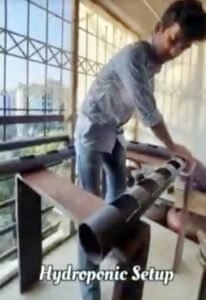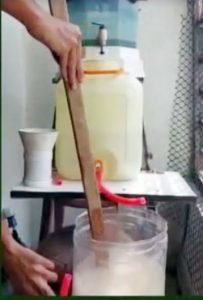Hydroponic Farming from Treated Grey Water
INTRODUCTION
 Hydroponics is a type of horticulture and a sub set of hydroculture which involves growing plant (usually crops) without soil , by using mineral nutrient solutions .Terrestrial plants may grow with their roots exposed to the nutritious liquid.
Hydroponics is a type of horticulture and a sub set of hydroculture which involves growing plant (usually crops) without soil , by using mineral nutrient solutions .Terrestrial plants may grow with their roots exposed to the nutritious liquid.- Benefits of hydroponic farming over conventional farming are as follows:-
- Greater Yields.
- Less Space Needed.
- Less Water.
- Sustainable Farming.
- Not dependent on climate.
OBJECTIVE
- To study characteristic of household grey water collected from our house.(pH, BOD, COD, oil & grease)
- Treatment of grey water. a)Primary treatment – pre-treatment to secondary treatment:-
- It is to recycle the grey water and use it as a nutrient water in hydroponic farming.
- To design a small residential unit of Hydroponic system with the maximum use of grey water to grow plants.
1. Screening
2. Equalization
b) Secondary treatment:-
1. Gravel filtration
2. Sand filtration
3. Chlorination
ADVANTAGES
- Production increases 3 to 10 times in the same amount of space.
- Many crops can be produced twice as fast in a well managed hydroponic system.
- Decreasing the time between harvest and consumption increases the nutritional value of the end product.
- Indoor farming in a climate controlled environment means farms can exist in places where weather and soil conditions are not favorable for traditional food production.
- No chemical weed or pest control products are needed when operating a hydroponic system.
METHODOLOGY
 Step 1 : Collection of grey water into a grey water collection tank.
Step 1 : Collection of grey water into a grey water collection tank.
Step 2 : Testing of untreated grey water in nearby testing lab.
Step 3 : Treatment of grey water which includes:
a) Collection tank (A mesh at input).
b) Disinfectant tank – (Coagulation process by adding alum and lime).
c) Storage tank for treated grey water .
Step 4 : Testing of the treated grey water and comparing it with the untreated testing results.
Step 5 : Based on the results of lab testing , we will add necessary nutrients in treated water.
Step 6 : Then this nutrient rich water will be passed to the Hydroponic system.
Survey Camp
 It is the civil engineering training course for departmental students for 3/5 days in the field & map preparation. As per the Experts, survey camp provides necessary foundation for Civil Engineers. In most surveying courses a certain amount of field practice is given in connection with the study of the text. Field problems, designed to give the student some practice in the elementary operations of surveying are outlined in this course later. It is not possible, in the ordinary field courses in surveying, to develop the student into a surveying expert. It is expected, however, that the course will give the student a working knowledge of surveying instruments and their uses, as well as knowledge of working techniques. On all surveys the fieldwork is of primary importance. To become skilled in surveying operations requires a certain amount of experience in the field.
It is the civil engineering training course for departmental students for 3/5 days in the field & map preparation. As per the Experts, survey camp provides necessary foundation for Civil Engineers. In most surveying courses a certain amount of field practice is given in connection with the study of the text. Field problems, designed to give the student some practice in the elementary operations of surveying are outlined in this course later. It is not possible, in the ordinary field courses in surveying, to develop the student into a surveying expert. It is expected, however, that the course will give the student a working knowledge of surveying instruments and their uses, as well as knowledge of working techniques. On all surveys the fieldwork is of primary importance. To become skilled in surveying operations requires a certain amount of experience in the field.


 Hydroponics is a type of horticulture and a sub set of hydroculture which involves growing plant (usually crops) without soil , by using mineral nutrient solutions .Terrestrial plants may grow with their roots exposed to the nutritious liquid.
Hydroponics is a type of horticulture and a sub set of hydroculture which involves growing plant (usually crops) without soil , by using mineral nutrient solutions .Terrestrial plants may grow with their roots exposed to the nutritious liquid.